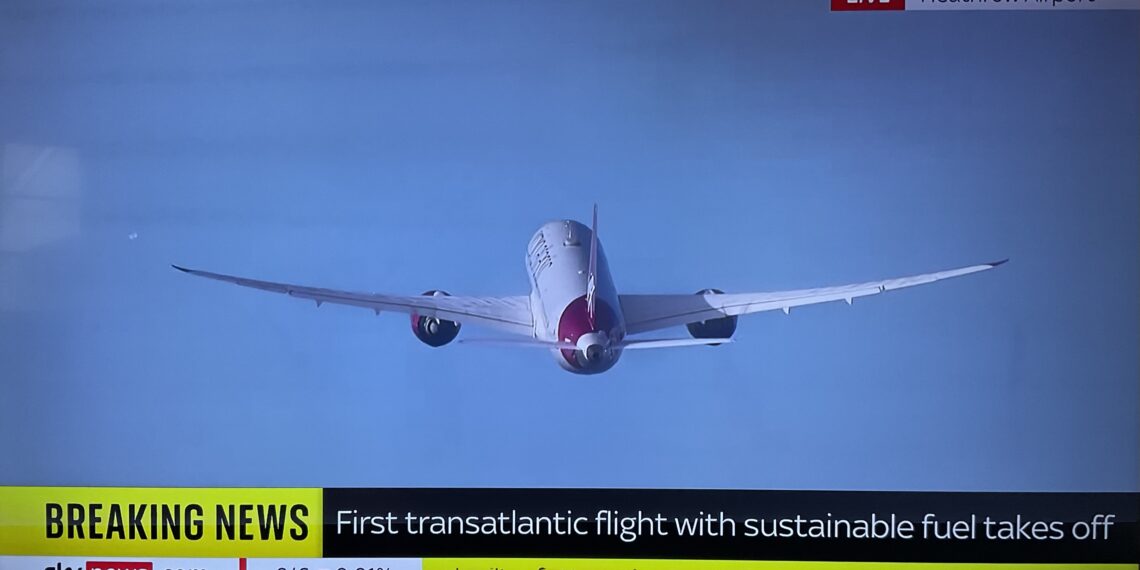It’s been dubbed the ‘first cooking oil fuelled transatlantic flight’ and the Boeing 787 Dreamliner, called “Virgin100” flight took off on time from London Heathrow bound for New York using sustainable aircraft fuel
The Boeing 787 Dreamliner powered by Rolls-Royce jet engines carried 50 tonnes of sustainable aircraft fuel (SAF) with two types being used: 88% derived from waste fats and the rest from the wastes of corn production in the USA – production involves using about 70% less carbon.
Following test and analysis, the flight was approved by the UK regulator the Civil Aviation Authority earlier this month. Several companies have been involved in the project including engine maker Rolls-Royce and energy giant BP.
Virgin founder Richard Branson said: “So proud to be onboard Virgin Atlantic’s Flight100 today, the world’s first 100% SAF transatlantic flight by a commercial airline.
“The world will always assume something can’t be done… until you do it. The spirit of innovation is getting out there and trying to prove that we can do things better for everyone’s benefit. This flight today shows that sustainable jet fuel can be used as a drop-in replacement for jet fuel – and it is the only viable solution for decarbonising long-haul flights.
“A huge well done to the Virgin Atlantic team and all of our partners for coming together and making this happen – now we’ve shown that it can work, it will take industry and governments to make it an everyday reality. Our greatest challenges are also our greatest opportunities – but no one can do this alone. There’s still a long way to go, there simply isn’t enough sustainable aviation fuel – the next step is to see policy change in the UK and US and investment to change that.”
But speaking exclusively to The Independent, Virgin Atlantic’s chief executive, Shai Weiss, said: “To think that we can magic up the elimination of flying, I think is naive to an extreme.”
His airline says the aim is to demonstrate that SAF is a “safe drop-in replacement for fossil-derived jet fuel, compatible with today’s engines, airframes and fuel infrastructure”.
continues below picture

Branson took the opportunity to reveal other details of the flight, which had no paying passengers: “Virgin Atlantic has also partnered with Virgin Unite and the Rocky Mountain Institute (RMI) to fund valuable work to collect information on contrail emissions during the flight. These tests will advance the science around contrails and help to develop in-flight procedures that may significantly reduce aviation’s climate impact.
“Flying onboard Flight100 reminded me of other moments where we’ve pushed for change. One of those is when we tried to encourage Airbus and Boeing to make their planes using carbon fibre composite, which would reduce the amount of fuel used and cut enormous amounts of carbon emissions, but they weren’t sure it could be done.
“We wanted to show them it could work, so aerospace engineer Burt Rutan built a plane for us that we called the Virgin Atlantic GlobalFlyer and we flew it around the world non-stop, breaking records, with Steve Fossett – demonstrating that carbon fibre worked. Not only did it work, it was the most carbon-efficient aircraft ever built.”
The UK Government has handed over cash to Virgin Atlantic to help drive the change to SAF. In a statement, it said:
“The Transport Secretary travelled on the flight alongside Virgin Atlantic Chief Executive Shai Weiss and Virgin’s founder, Sir Richard Branson, making them the first commercial airline to fly across the pond without the use of any fossil-based jet fuel.
“Today’s flight is a major milestone towards making air travel more environmentally friendly as we move towards our goal of net zero by 2050. The historic trip is powered by SAF made from waste fats that cannot enter the food chain. Repurposing waste products into jet fuel to cut emissions provides the most immediate solution to help decarbonise our skies.
“Virgin Atlantic and their consortium were awarded up to £1 million of UK government funding in December 2022, following a challenge from the Department for Transport to support the industry in achieving the first transatlantic flight on a commercial aircraft powered by 100% SAF. The funding has played a vital role in supporting the testing of today’s fuel and the flight’s operational delivery to make this a reality. It will also provide an opportunity to generate important data that will accelerate SAF approval and boost our understanding of its efficiency.
“SAF has a greenhouse gas emissions reduction of around 70% when compared against standard jet fuel over its life cycle – allowing greener travel and keeping the UK connected to the world.
“With the world about to convene in Dubai COP28 this week, today lays down a marker that the UK is already taking action when it comes to tackling the decarbonisation challenges that face the transport sector.”
Transport Secretary, Mark Harper, said: “Today’s historic flight, powered by 100% sustainable aviation fuel, shows how we can both decarbonise transport and enable passengers to keep flying when and where they want.
“This government has backed today’s flight to take-off and we will continue to support the UK’s emerging SAF industry as it creates jobs, grows the economy and gets us to Jet Zero.”
SAF will become an increasing part of the standard jet fuel mix, driven by our upcoming SAF mandate, with at least 10% of jet fuel being from sustainable sources in 2030. This will mean that business or leisure travellers can fly knowing their carbon footprint will be lower than ever before.





